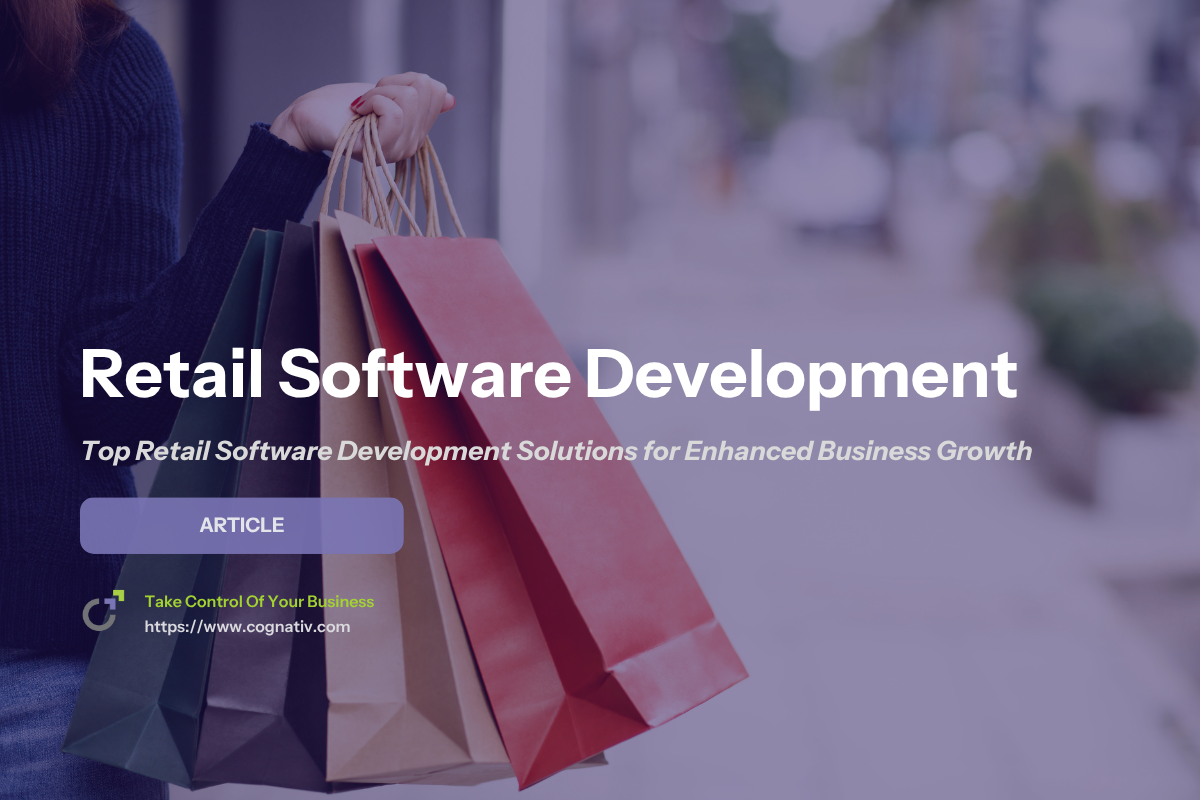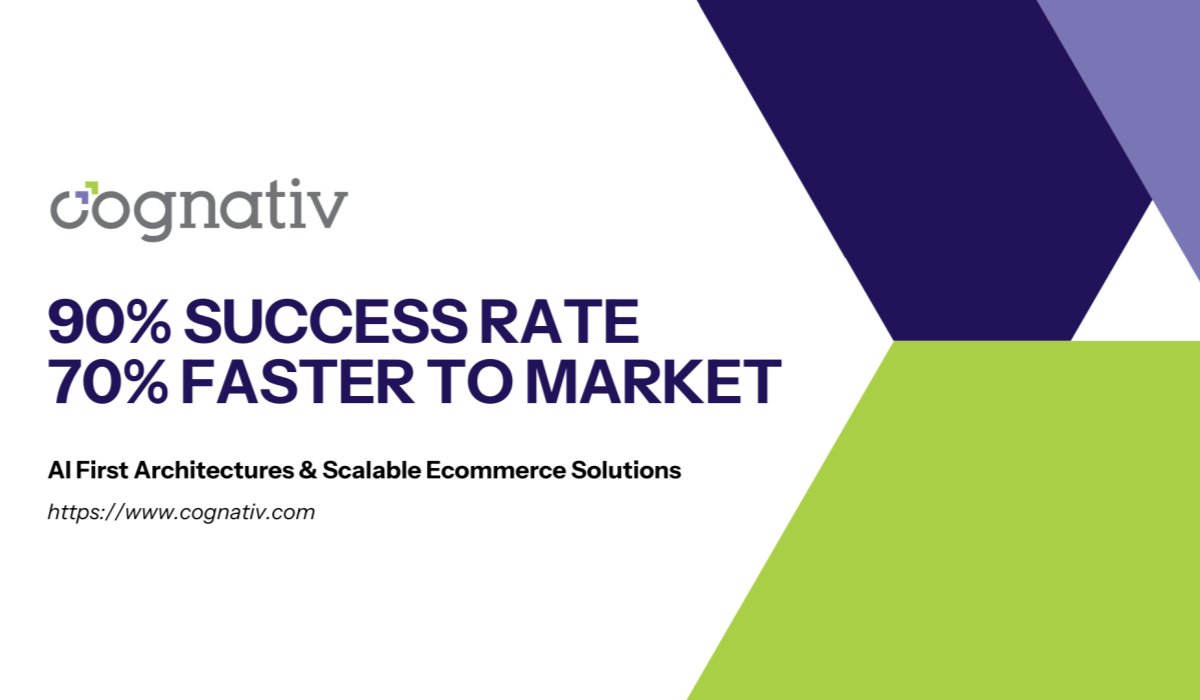Top Solutions in Retail Software Development: 2025 Guide
Looking to improve your retail operations? This guide on retail software development covers the essential benefits, types of solutions, and technologies you need to know. From enhancing inventory management to streamlining supply chains, discover how custom software can transform your retail business.
Key Takeaways
-
Custom retail software development enhances operational efficiency, customer satisfaction, and profitability through tailored solutions that address specific business needs.
-
Integration of advanced technologies such as AI, IoT, and AR significantly improves customer experiences, inventory management, and supply chain efficiency.
-
Choosing the right development partner requires assessing technical skills, industry-specific knowledge, and effective communication to ensure successful software implementation.
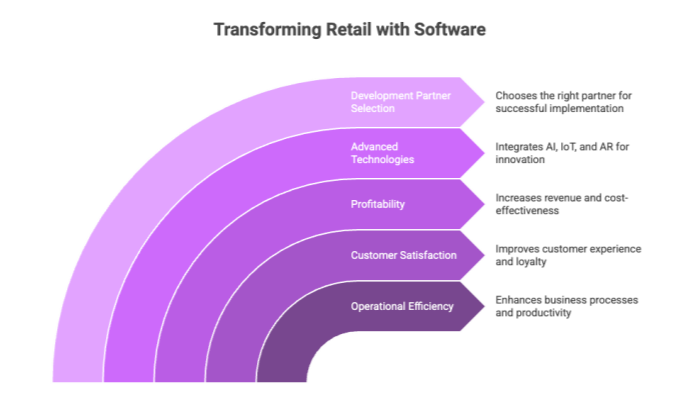

Key Benefits of Custom Retail Software Development
In the dynamic and competitive retail industry, custom retail software development offers significant benefits. A retail software development company can provide tailored software solution to develop retail solutions that address specific business needs, improving workflows and reducing operational costs.
Here are some key advantages of custom retail software development:
-
Automating repetitive tasks boosts productivity and operational efficiency.
-
Advanced software helps businesses stay ahead of consumer demands.
-
Enhances both efficiency and security.
Enhanced customer service is another significant advantage of custom retail software, personalized customer service, and enhancing customer service. Personalized experiences and improved engagement boost customer loyalty and drive repeat purchases. Innovative solutions enhance operational effectiveness and contribute to sales growth and profitability. Integration of specialized features not available in off-the-shelf solutions meets unique business requirements, further enhancing profitability.
Ultimately, custom retail software development greatly improves operational efficiency, customer satisfaction, and profitability. The following sections will explore the substantial impact of custom software on inventory management, customer relationship management (CRM), and supply chain management.
Enhanced Inventory Management
Effective inventory management is crucial for successful retail operations. Custom software solutions offer:
-
Real-time inventory tracking, providing visibility into stock levels and sales across multiple channels
-
Prevention of overstocking and ensuring items are available for purchase, enhancing operational efficiency
-
Automated reordering that places orders when stock levels fall below thresholds, maintaining optimal stock levels with retail inventory management software.
Integrating IoT technology into inventory management systems results in more accurate stock counts and faster order fulfillment. Advanced software also improves accuracy, reduces errors, and minimizes excess stock, significantly lowering operational costs while optimizing inventory levels.
Incorporating warehouse management systems and retail inventory management systems streamlines operations and improves efficiency. These solutions enhance customer service and support better decision-making with advanced analytics and inventory tracking capabilities.
Improved Customer Relationship Management (CRM)
Customer relationship management (CRM) is essential for fostering strong customer engagement and loyalty. Custom CRM solutions offer a comprehensive view of customer data, enabling personalized services and exceptional experiences. Understanding customer preferences and behaviors through detailed profiles helps businesses craft better sales strategies and marketing campaigns, driving higher conversion rates and retention.
Integrating online and offline interactions within CRM systems provides a comprehensive approach to customer management, enhancing satisfaction. Custom software development enables seamless integration of CRM with other systems like ecommerce platforms and marketing automation tools, facilitating streamlined operations and targeted marketing.
Ultimately, custom CRM solutions in retail lead to increased loyalty, sales growth, and better customer experiences through loyalty programs. Iterative development cycles allow for continuous integration of user feedback, resulting in improved software quality and enhanced satisfaction.
Streamlined Supply Chain Management
Streamlined supply chain management optimizes workflows, reduces costs, and enhances customer satisfaction. Custom software development provides real-time visibility into supply chain processes, enabling order automation, vendor performance metrics, and waste reduction. This visibility allows for data-driven decisions that improve efficiency and support better supply chain management.
Retail apps can connect with supply chain management systems, POS solutions, accounting software, and marketing automation tools, creating seamless integration that enhances overall business processes. This ensures all systems work together harmoniously, supporting streamlined operations and better decision-making.
Streamlining supply chain operations through custom software enhances digital presence and delivers exceptional customer experiences. The result is a more efficient, cost-effective, and customer-centric approach to retail operations.
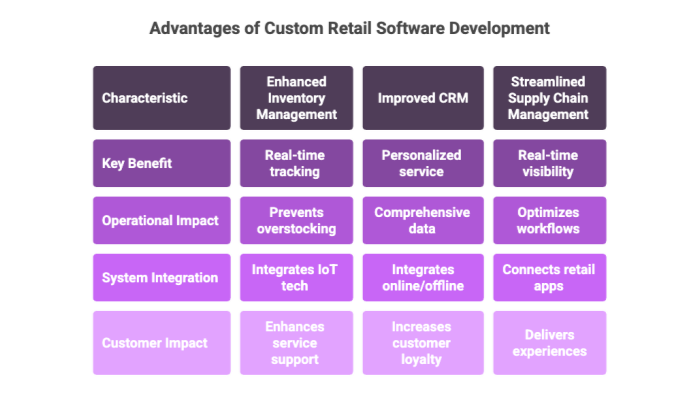

Types of Retail Software Solutions
Retail software solutions come in various forms, each addressing specific operational needs. Core types include POS systems, ecommerce platforms, and retail analytics solutions. These enhance various aspects of retail operations, from inventory management and payment processing to customer relationship management and retail solutions sales analysis.
Custom mobile and web applications play a significant role in modern retail business, increasing engagement and boosting sales. With the right retail app development and software development services, businesses can create tailored solutions that address their unique challenges and opportunities.
The following subsections explore key types of retail software solutions in more detail.
Point of Sale (POS) Systems
Point of Sale (POS) systems are essential for processing payments, synchronizing inventory, and tracking customer loyalty. Modern point of sale systems handle diverse payment methods, including card, cash, phone, wearable payments, mobile wallets, and contactless payments, making transactions more convenient for customers. Self-checkout software enhances the experience by efficiently updating inventory counts with payment processing software.
Successful integration with POS systems maintains accurate inventory across ecommerce platforms and physical stores. This ensures up-to-date stock levels, reducing the risk of overstocking or stockouts and improving overall efficiency.
Leveraging advanced POS systems allows retail businesses to streamline operations, enhance customer service, and drive sales growth. These systems are a critical component of comprehensive retail software solutions.
Ecommerce Platforms
Ecommerce platforms facilitate online sales and integrate with back-office systems to streamline order processing. They come in various forms, including web stores, marketplaces, mobile apps, and auction platforms, each offering unique functionalities. For example, Adobe Commerce (formerly Magento) is a scalable and flexible platform that drives online sales.
Custom-developed platforms, like those by Cognativ, specialize in marketplace functionalities, payment gateways, and inventory management, providing comprehensive solutions for online retail operations. By analyzing customer behavior and preferences, ecommerce platforms enhance engagement through targeted interactions and personalized experiences.
Integrating ecommerce platforms with other retail software solutions, such as POS systems and CRM tools, ensures a seamless customer experience across online and offline channels. This integration is crucial for modern retailers aiming to maximize online sales and customer satisfaction.
Retail Analytics Solutions
Retail analytics solutions are foundational for understanding customer behavior and improving overall operations. These tools enable:
-
Effective inventory allocation
-
Avoiding overstocking or stockouts
-
Predicting demand based on sales trends
-
Optimizing pricing strategies through demand and competitor data analysis
This maximizes profitability and competitiveness.
A robust analytics tool in retail requires clean, accurate data and well-structured data management processes. This ensures insights are reliable and actionable, supporting better decision-making and strategic planning.
Advanced retail analytics enhance marketing campaigns by providing insights into customer behavior, purchase history, and market trends. Leveraging these insights allows businesses to create targeted promotions and personalized experiences, driving sales and loyalty.
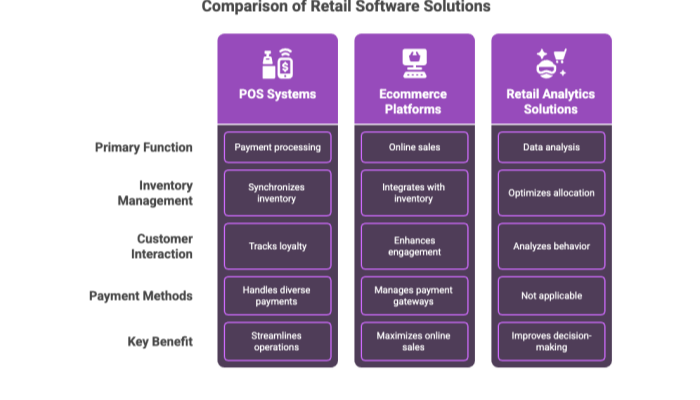

Advanced Technologies in Retail Software Development
Integrating advanced technologies in retail software development has revolutionized the industry, offering innovative solutions that enhance operational efficiency and customer experiences. Technologies such as AI, IoT, and AR are at the forefront of this transformation, helping retailers stay competitive in a rapidly evolving market.
Modern custom retail software offers AI-based analytics, AR-driven virtual try-ons, and IoT-integrated inventory systems, among other features. These technologies optimize operations and provide a competitive advantage by adapting to the digital landscape and meeting evolving customer needs. The following subsections explore the impact of AI, IoT, and AR in retail software development.
AI and Machine Learning
AI and machine learning are integral to personalizing shopping experiences and enhancing customer engagement. Analyzing data patterns allows AI to create tailored experiences that cater to individual preferences. AI demand forecasting, using time series methodology and combining Gradient Boosting and KNN models, helps predict sales trends and support data-driven decisions.
Machine learning tools are essential for targeted recommendations or promotions within customer interactions, driving higher conversion rates and loyalty. AI algorithms in virtual try-on technology accurately segment body or facial features, enhancing the online shopping experience and reducing return rates.
Integrating AI and machine learning allows retail businesses to optimize customer support, improve inventory management, and enhance overall efficiency. These technologies are critical for staying competitive in the modern retail landscape.
Internet of Things (IoT)
The Internet of Things (IoT) profoundly impacts retail efficiency by connecting stores and warehouses, gathering data on customer behavior and product movement. IoT enhances inventory tracking by providing real-time insights into stock levels and product locations, reducing the risk of overstocking or stockouts.
Integrating IoT with retail software solutions improves operational efficiency and customer engagement. Data collected through IoT devices can be analyzed to optimize supply chain management, streamline operations, and enhance customer service.
IoT is a powerful tool for modernizing retail operations and maintaining a competitive edge.
Augmented Reality (AR)
Augmented Reality (AR) transforms the retail experience by offering virtual try-ons, immersive product visualizations, and interactive shopping experiences. AR applications, like virtual fitting rooms, let customers see how products will look and fit without physically trying them on, significantly enhancing interaction and satisfaction. This technology not only improves the shopping experience but also reduces return rates, benefiting both customers and retailers.
AR and VR solutions help store owners by simulating sales situations for training purposes and educating staff on products. Incorporating AR into retail software offers a more engaging and personalized shopping experience, driving customer loyalty and sales growth.
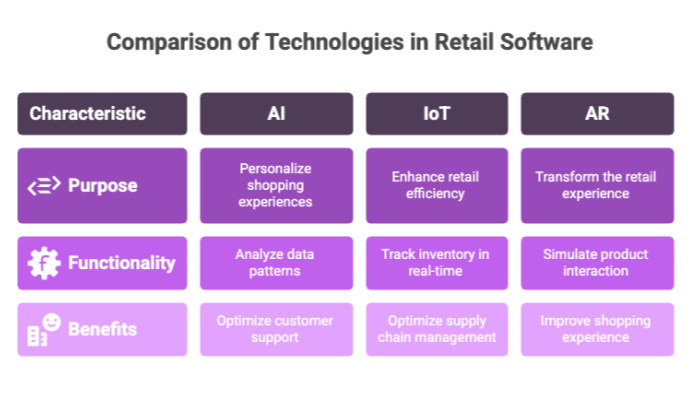

Key Considerations in Retail Software Development
Developing effective retail software requires careful consideration of key factors. Integration with existing systems, data security and compliance, and scalability and flexibility are crucial for ensuring the software meets business needs and adapts to changing market conditions. Conducting thorough business analysis and gathering requirements are essential first steps in aligning the software with specific business objectives.
Accurate project scoping, including defining objectives, constraints, and deliverables, is vital for effective cost estimation and project timelines. Additionally, involving employees, store managers, and end customers in the requirement analysis ensures the software caters to all user needs and supports better decision-making. In the following subsections, we’ll explore these key considerations in more detail.
Integration with Existing Systems
Seamless integration of retail software with existing systems enhances productivity and supports better decision-making. Implementing ERP systems in retail allows for real-time data synchronization and data-driven insights, crucial for effective sales data management in a POS system. Integration with accounting and CRM systems ensures that all business processes work together harmoniously, reducing the risk of data conflicts and incompatible interfaces.
Retail software integration focuses on systems such as point-of-sale, inventory management, and ecommerce platforms, ensuring that all components of the retail operation are aligned and functioning efficiently. Adding new features to legacy software poses risks, so conducting a thorough software audit before enhancement is essential to minimize integration issues. A phased modernization strategy can help reduce downtime and ensure a smooth transition during integration.
Ongoing maintenance of retail software involves fixing bugs and adding features to keep up with user expectations post-integration. Having easy data import and export capabilities in retail management software ensures minimal disruption during integration, allowing businesses to continue operating efficiently.
Data Security and Compliance
Data security in retail software is essential to protect sensitive customer and business data. Inadequate handling of customer data can lead to compliance violations and loss of customer trust, making robust security measures critical.
To safeguard software against cyber threats, employing measures such as:
-
encryption
-
regular security audits
-
multi-factor authentication
-
security audits
is necessary.
Aligning software development with security standards such as ISO 27001 and SOC 2 helps ensure compliance from the outset. Involving a legal advisor early when developing compliance measures for data protection ensures that all regulatory requirements are met, protecting the company’s reputation and avoiding large fines.
The support team plays a crucial role in detecting and resolving technical issues, mitigating security risks, and ensuring compliance.
Scalability and Flexibility
Retail software should be designed to accommodate fluctuating customer demands and rapid business expansion. Seamless scalability ensures that retail platforms can expand and adapt as the business grows, preventing loss of revenue and potential alienation of loyal customers during traffic spikes. Project requirements, industry specifics, and business goals are critical factors in selecting technologies for scalable retail software.
Load-balancing strategies and modular code structures are effective methods for ensuring scalability in retail software. Regular assessments and frequent evaluations through retrospectives help identify areas for improvement, thus promoting ongoing software quality enhancement.
Seeking partners with industry-specific experience can further enhance the development of scalable software solutions and create solutions.
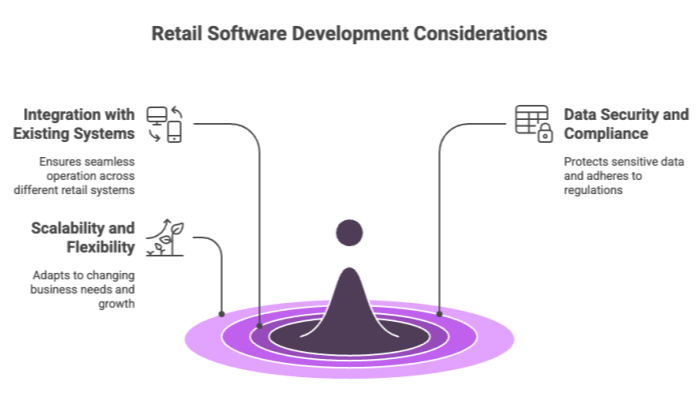

Success Stories in Retail Software Development
Success stories in retail software development illustrate the practical applications and benefits of custom retail software. These real-world examples demonstrate how innovative solutions can transform traditional retailers into omnichannel powerhouses and enhance inventory management for global retail chains. By meeting client objectives and market demands, these success stories showcase the potential of retail software development services to drive business growth and customer satisfaction.
Appinventiv and Cognativ are two companies with a deep understanding of retail dynamics and a proven track record of delivering successful retail software solutions. In the following subsections, we’ll explore two case studies that highlight the transformative impact of custom retail software.
Case Study: Transforming a Traditional Retailer into an Omnichannel Powerhouse
In this case study, a leading fashion retailer sought to deliver a unified shopping experience across various platforms, improving customer satisfaction and loyalty. The retailer developed a top fashion retail app that facilitated seamless integration of online orders and in-store pickups, greatly enhancing the customer experience. Today’s customers expect consistent experiences whether shopping online, in-store, or through mobile applications, making omnichannel integration essential for modern retail businesses.
Omnichannel software solutions provide a unified shopping experience, significantly increasing customer loyalty and satisfaction. By integrating online and offline channels, the retailer was able to deliver exceptional customer experiences and drive sales growth.
This transformation highlights the power of custom retail software development in meeting the evolving needs of customers and staying competitive in the retail industry through retail software modernization.
Case Study: Enhancing Inventory Management for a Global Retail Chain
This case study explores how a global retail chain enhanced its inventory management through advanced software solutions. Features like an adaptive selective model and statistical reports classified items to improve demand forecasting in inventory management systems. Implementing improved inventory management solutions led to boosted sales, attributed to more effective marketing campaigns and optimized stock levels.
The creation of an immersive ecommerce platform supported the integration of inventory management systems, enhancing customer experience and operational efficiency. Advanced inventory management software is crucial for reducing costs and improving operational efficiency in large retail chains.
By leveraging custom retail software, the international retail chains were able to achieve significant improvements in inventory tracking and customer satisfaction.
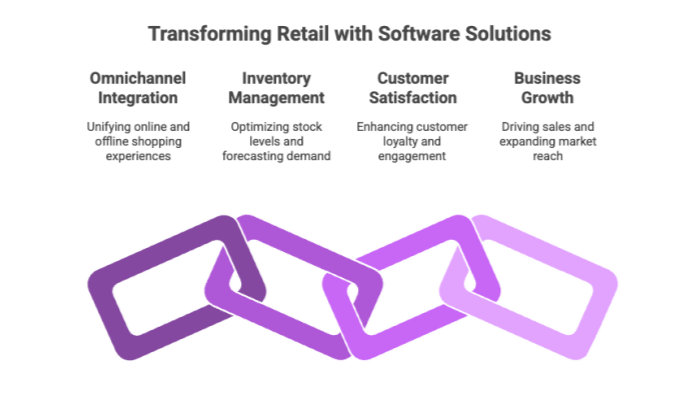

Choosing the Right Partner for Retail Software Development
Selecting the right partner for retail software development is crucial in achieving project success and aligning with business goals. Effective collaboration among developers, stakeholders, and end-users fosters transparency, ensuring everyone is aligned with project objectives. Regular communication and agile practices enhance project outcomes by fostering a collaborative environment that addresses user needs and market demands.
A successful software development partner should demonstrate a strong commitment to understanding the client’s vision and business goals. Confirming adherence to data protection regulations and stringent security protocols is also essential when evaluating potential partners.
In the following subsections, we’ll explore the key criteria for choosing the right retail software development partner.
Evaluating Technical Expertise
Assessing a partner’s technical skills is crucial for the success of retail software development projects. This evaluation should include examining their experience with specific technologies relevant to retail, such as adaptable microservices architectures that can effectively handle large user bases.
Arranging a trial project or a smaller phase of work is recommended before fully committing to a software development partner, ensuring their technical capabilities align with project needs.
By evaluating the technical expertise of potential partners, retail businesses can ensure that the chosen partner is equipped to deliver high-quality software solutions that meet user expectations and business objectives.
Importance of Industry-Specific Knowledge
Having industry-specific knowledge is crucial for effectively addressing the unique challenges faced by retail businesses. Partners with a thorough grasp of retail trends can provide tailored solutions that better address market demands and customer expectations. Key criteria for evaluating a retail software development partner include technical expertise, industry experience, and a solid portfolio of successful projects.
Cognativ, for example, possesses a decade of experience in developing sophisticated web platforms and applications for the retail sector. By choosing a partner with industry-specific knowledge, retail businesses can ensure that their software solutions are compliant, scalable, and aligned with evolving customer needs.
Assessing Communication and Support
Effective communication and ongoing support are critical for the successful implementation and adaptation of retail software solutions. Appinventiv, for instance, provides proactive support and strategic insights to its partners, ensuring they can navigate challenges effectively. Types of support during and after development can include technical troubleshooting, software updates, and strategic consultations.
Best practices for effective communication include regular updates, feedback loops, and utilizing collaboration tools. By assessing communication and support capabilities, retail businesses can ensure a smooth development process and successful long-term software adoption.
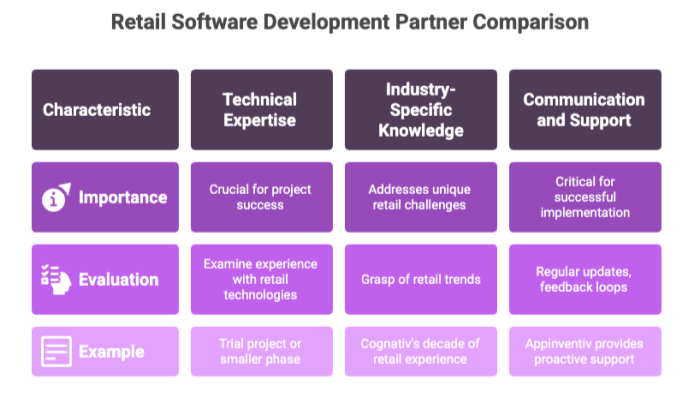

Agile Methodology in Retail Software Development
Agile methodology has become a cornerstone of effective retail software development, prioritizing collaboration and results to achieve successful project outcomes. The agile approach emphasizes flexibility and responsiveness to market demands, ensuring that retail software solutions can adapt to changing business needs. An agile team ensures expert handling from inception to implementation, enhancing project management and overall software quality.
In the following subsections, we’ll explore the key aspects of agile methodology: Iterative Development and Feedback Loops, Collaboration and Transparency, and Continuous Improvement and Adaptability.
Iterative Development and Feedback Loops
Iterative development and feedback loops are essential components of agile methodology, allowing for continuous improvement and alignment with user expectations. Agile project management approaches, such as those demonstrated by PSSPL, showcase the flexibility needed to handle unforeseen changes and enhance project outcomes. By implementing iterative development, retail businesses can ensure that their software solutions remain relevant and effective in a rapidly changing market.
The iterative process involves regular feedback from stakeholders and end-users, enabling developers to make necessary adjustments and improvements throughout the project lifecycle. This approach ensures that the final product meets user needs and delivers exceptional customer experiences.
Collaboration and Transparency
Collaboration and transparency are crucial for the success of retail software projects. Effective communication with a development partner fosters a collaborative environment that enhances project outcomes. Involving stakeholders throughout the development process ensures that the final product meets the needs of all parties involved and aligns with business objectives.
A collaborative approach leads to better alignment of project goals and user requirements, improving overall software quality and customer satisfaction. By fostering transparent communication and regular updates, retail businesses can ensure a smooth development process and successful software implementation.
Continuous Improvement and Adaptability
Continuous improvement and adaptability are key principles of agile methodology, essential for enhancing software quality and aligning with user expectations. Scalability and flexibility in retail software solutions are crucial for adapting to changing market demands and facilitating business growth. By fostering a collaborative environment where developers, stakeholders, and end-users communicate openly, retail businesses can achieve project objectives and success.
Regular evaluations and retrospectives help identify areas for improvement, promoting ongoing software quality enhancement and better alignment with business needs. This continuous improvement approach ensures that retail software solutions remain effective and relevant in a dynamic market environment.
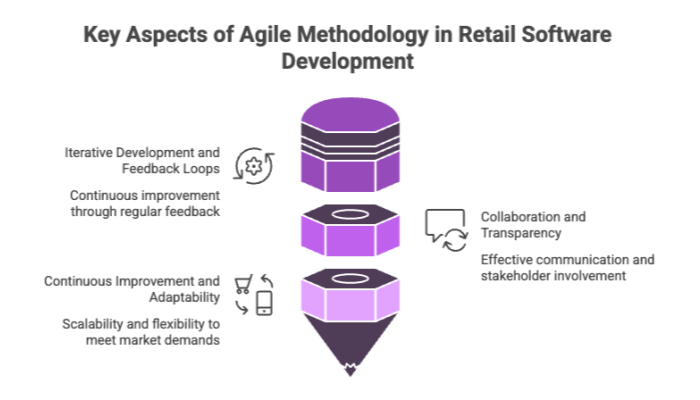

Summary
In summary, custom retail software development offers significant benefits, including enhanced inventory management, improved customer relationship management, and streamlined supply chain management. By leveraging advanced technologies like AI, IoT, and AR, retail businesses can optimize operations and deliver exceptional customer experiences. Key considerations such as integration with existing systems, data security and compliance, and scalability and flexibility are crucial for developing effective retail software solutions.
Success stories from companies like Appinventiv and Cognativ illustrate the transformative impact of custom retail software, highlighting the importance of selecting the right development partner.
Agile methodology, with its focus on iterative development, collaboration, and continuous improvement, ensures that retail software projects are successful and aligned with business goals. Embrace the potential of custom retail software development to stay competitive and thrive in the ever-evolving retail industry.

Frequently Asked Questions
What are the key benefits of custom retail software development?
Custom retail software development significantly improves operational efficiency and customer satisfaction by automating tasks and optimizing workflows, ultimately leading to increased profitability. Investing in tailored solutions allows businesses to deliver personalized experiences that resonate with their customers.
How does retail software improve inventory management?
Retail software significantly improves inventory management by providing real-time tracking, automating reordering processes, and integrating with warehouse systems, which collectively enhance operational efficiency and reduce costs.
Why is data security important in retail software development?
Data security is vital in retail software development to safeguard sensitive customer and business information, ensure regulatory compliance, and uphold customer trust through robust protections such as encryption and regular security audits.
What role do advanced technologies play in retail software development?
Advanced technologies such as AI, IoT, and AR are crucial in retail software development as they optimize operations and enhance customer experiences, thereby providing a competitive advantage. Embracing these technologies allows retailers to adapt to the digital landscape and meet evolving customer needs effectively.
How does agile methodology benefit retail software development?
Agile methodology benefits retail software development by fostering collaboration, enabling iterative progress, and promoting continuous improvement, which allows for flexible solutions that respond timely to market demands and user needs.
